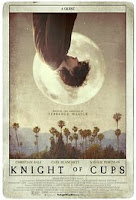If you have yet to see this film, you may think the title is rather grandiose in light of its subject; the pet
cemetery business. But for some, 'gates of heaven' is a misnomer without their beloved pets beyond the gates. Regardless, the film certainly goes beyond mere logistics of pet disposal and into the meaning and value we attribute to things and how they shape our lives.
The film starts off with an interview with Floyd "Mac" MacClure; he is a man on a mission to provide a real sanctuary for the pets that fulfil human lives by being loved and loving in return. He speaks with zeal and conviction. There is something dogmatic about it; it is not an animal rights argument rather it is a Christian argument: God sent us pets to be loved and to love us therefore we should give them a respectful burial.
Mac's view is contrasted by an interview with the owner of the local rendering plant; what Mac perceives as the devil's work, is actually performed by a really nice guy. He is genuinely curious with the various reactions people have against his business. He tells of many horrified responses people have had towards his business in a matter-of-fact manner without taking any offense. For him, the animal carcasses are merely raw material for his rendering plant, to be properly recycled into various products.
Mac's business partners are sympathetic to Mac's opinions but they find him peculiar. Their prerogative is in the financial interest of the business that eventually comes up against Mac's beliefs when the business partners suggest burying pets on top of old burials to save space and make more profits. In the end, there is a huge controversy that ends with the entire cemetery getting dug up and re-buried in the Bubbling Well Pet Cemetery Park run by the Harberts family.
At this point the film takes a more philosophical turn and explores themes of life and success through the interviews of family members. Cal, the elder son, wants to be a CEO sitting behind a big mahogany desk of a large corporation. He isn't quite sure how pet cemetery will fit into that picture but he seems eager for people to know that he knows exactly what he's doing. For the younger son Dan, the cemetery business provides him with a beautiful place to live and enough time to enjoy playing the guitar and examining the landscape.
It seems that the binary vision of faith and rationality in the film found a third possibility; an independent mind that is neither persuaded by the bible nor excessively interested wealth. Dan is at peace in his humble existence and it seems like a good spot to be in.
cemetery business. But for some, 'gates of heaven' is a misnomer without their beloved pets beyond the gates. Regardless, the film certainly goes beyond mere logistics of pet disposal and into the meaning and value we attribute to things and how they shape our lives.
The film starts off with an interview with Floyd "Mac" MacClure; he is a man on a mission to provide a real sanctuary for the pets that fulfil human lives by being loved and loving in return. He speaks with zeal and conviction. There is something dogmatic about it; it is not an animal rights argument rather it is a Christian argument: God sent us pets to be loved and to love us therefore we should give them a respectful burial.
Mac's view is contrasted by an interview with the owner of the local rendering plant; what Mac perceives as the devil's work, is actually performed by a really nice guy. He is genuinely curious with the various reactions people have against his business. He tells of many horrified responses people have had towards his business in a matter-of-fact manner without taking any offense. For him, the animal carcasses are merely raw material for his rendering plant, to be properly recycled into various products.
Mac's business partners are sympathetic to Mac's opinions but they find him peculiar. Their prerogative is in the financial interest of the business that eventually comes up against Mac's beliefs when the business partners suggest burying pets on top of old burials to save space and make more profits. In the end, there is a huge controversy that ends with the entire cemetery getting dug up and re-buried in the Bubbling Well Pet Cemetery Park run by the Harberts family.
At this point the film takes a more philosophical turn and explores themes of life and success through the interviews of family members. Cal, the elder son, wants to be a CEO sitting behind a big mahogany desk of a large corporation. He isn't quite sure how pet cemetery will fit into that picture but he seems eager for people to know that he knows exactly what he's doing. For the younger son Dan, the cemetery business provides him with a beautiful place to live and enough time to enjoy playing the guitar and examining the landscape.
It seems that the binary vision of faith and rationality in the film found a third possibility; an independent mind that is neither persuaded by the bible nor excessively interested wealth. Dan is at peace in his humble existence and it seems like a good spot to be in.

